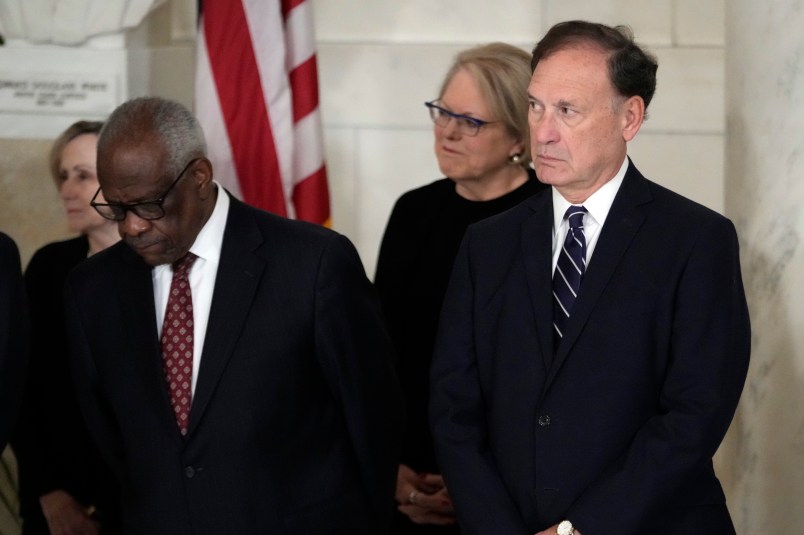The Supreme Court threw up yet more impediments to protecting minority voters Thursday — one of the conservatives’ most successful crusades and one that has already become a legacy of the Roberts Court.
Justice Samuel Alito wrote the majority opinion, joined by all of his right-wing peers (except for Justice Clarence Thomas in one section). The three liberals dissented. The case — Alexander v. South Carolina State Conference of the NAACP — stems from a congressional map in South Carolina; the Court took so long in handing down a ruling that the state’s 2024 elections were already set to take place under the map that a district panel found to be racially gerrymandered.
Alito, as Justice Elena Kagan described in her dissent, “cherrypicked” evidence brought at trial to reverse engineer a conclusion that the map was really drawn to give Republicans a partisan advantage, not to disempower Black voters. Such a distinction means little in a region where race and partisan lean are often closely aligned, but the Supreme Court previously barred partisan gerrymandering claims from being heard in federal court.
The effect of the decision will be to make it even harder to win racial gerrymandering claims.
Throughout, Alito consistently expresses more concern about the feelings of South Carolina legislators than he does about their role in disenfranchising their own voters.
“When a federal court finds that race drove a legislature’s districting decisions, it is declaring that the legislature engaged in ‘offensive and demeaning’ conduct that ‘bears an uncomfortable resemblance to political apartheid,’” he wrote, quoting old cases. “We should not be quick to hurl such accusations at the political branches.”
Rather than worrying states will use the close relationship of partisan lean and racial makeup to get away with racial gerrymanders, Alito instead frets that challengers — usually voting rights groups and voters themselves — will successfully knock down partisan gerrymanders in federal court under that cover.
In her dissent, Kagan hammered Alito for appointing himself as an additional attorney to help South Carolina’s case.
“Such micro-management of a plaintiff ’s case is elsewhere unheard of in constitutional litigation,” she wrote.
That micromanagement carried into his assessment of the facts, she wrote, leading him to greenlight those that favored the state’s argument and to dismiss those that didn’t.
“This Court is not supposed to be so fearful of telling discriminators, including States, to stop discriminating,” she added.
She ended her dissent with a look to the future — where states simply have to raise the “possibility” that they drew their gerrymanders with criteria other than race in mind to get off scot-free.
“When racial classifications in voting are at issue, the majority says, every doubt must be resolved in favor of the State, lest (heaven forfend) it be ‘accus[ed]’ of ‘offensive and demeaning’ conduct,” she eyerolled.
Thomas, writing separately, mildly criticizes Alito for redoing the work of the district court before taking an extreme position: that redistricting questions shouldn’t be decided by federal courts at all. Full stop.
“In my view, the Court has no power to decide these types of claims,” he wrote. “Drawing political districts is a task for politicians, not federal judges. There are no judicially manageable standards for resolving claims about districting, and, regardless, the Constitution commits those issues exclusively to the political branches.”
Thomas’ positions, once fringe, have increasingly become the guiding light for this far-right Court.
Read the ruling here:
Correction: This case was brought under the 14th and 15th Amendments, not the Voting Rights Act. We regret the error.







What I don’t understand is how partisan gerrymandering is any less onerous than racial gerrymandering.
All courtesy of the Greens and Bernie Bros.
I guess this makes it acceptable for Clarance and Ginni raise the confederate flag on their property.
“Every discussion which is made from an egoistic standpoint is corrupted from the start and cannot yield an absolutely sure conclusion. The ego puts its own interest first and twists every argument, word, even fact to suit that interest.” ― Paul Brunton, Healing of the Self, the Negatives: Notebooks
It isn’t. It is all part of the slaveholder theory of government. They don’t even have to pretend anymore - what a relief it must be.